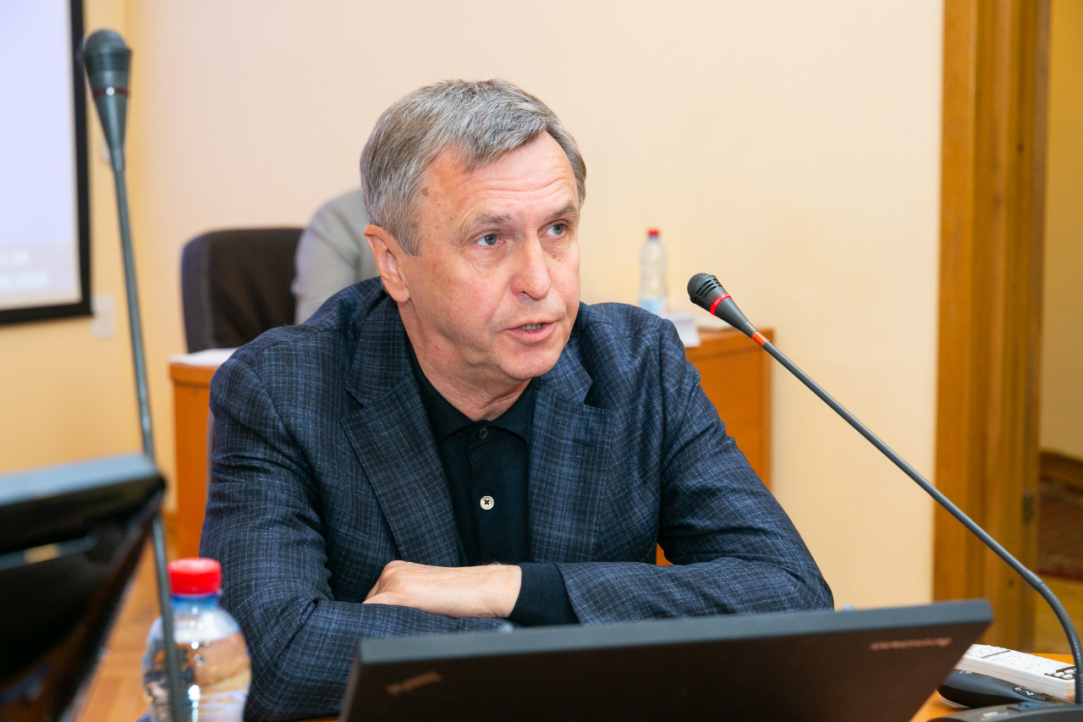Alexander Tonevitsky Recognized as Distinguished Scientist of Russia

Alexander Tonevitsky, Dean of the HSE Faculty of Biology and Biotechnologies and corresponding member of the RAS, was awarded the honorary title of Distinguished Scientist of the Russian Federation. The awards ceremony was held in the Kremlin on November 27.
Dr. Tonevitsky began his academic and medical career forty years ago at the Russian Health Ministry’s Cardiology Research Centre. In the 1990s, he worked at the State Research Institute of Genetics, the Institute of Immunology, and the Federal Research Centre of Transplantology and Artificial Organs. He later did work in pathophysiology and translational oncology and was elected a corresponding member of the Russian Academy of Sciences in 2006.
Dr. Tonevitsky has published 4 monographs and more than 250 scientific articles. His research spans a wide range of interests, including the development of non-invasive methods for the study of key homeostatic mechanisms, intracellular protein transport mechanisms, gene expression in the encoding of proteins that determine the functional state in humans, the molecular and genetic processes of adaptation to physical exertion (having run the Federal Science Centre for Physical Culture and Sport for several years), and microphysiological systems.
In addition to heading the Faculty of Biology and Biotechnologies at HSE, Dr. Tonevitsky heads the Department of Cell Biology and the Bachelor’s programme in Cellular and Molecular Biotechnologies that will induct its first incoming class in 2019.
See also:
Early Molecular Diagnosis of Cancer Proven More Cost-Effective Than Subsequent Treatment of Advanced Disease
Applying expensive diagnostic methods in clinical practice will ultimately cost society 5 to 10 times less than the expenditures associated with late-stage cancer treatment, including subsequent disability pensions and sick leave payments—these are the findings from a study conducted by researchers at the HSE Faculty of Economic Sciences Marina Kolosnitsyna and Anastasia Vladimirskaya in collaboration with colleagues at EVOGEN, a medical genetic laboratory, and the Department of Health of the Yamalo-Nenets Autonomous Okrug. The study results have been published in Social Aspects of Population Health.
Scientists Discover Cause of Metastasis Formation in Patients with Colorectal Cancer
An international team of researchers including scientists at the HSE Faculty of Biology and Biotechnology has identified factors which can increase the aggressiveness of tumours in patients with colorectal cancer. An isoform of CD44 protein has been found to play a pivotal role in the development of metastases. The study findings have been published in Molecular Oncology.
Scientists Have Developed a Model of Malignant Prostate Tumour and Used It to Test Drug Efficacy
Researchers from HSE University and the Russian Ministry of Health National Medical Research Radiological Centre have successfully generated a three-dimensional laboratory model of prostate cancer and used the model for testing an anti-tumour drug. In the future, this approach has the potential to significantly enhance the efficacy of cancer treatment for patients. The study’s findings have been published in Cancer Urology.
Nanai and Chukchi Found Intolerant to 'Mushroom Sugar'
A team of researchers from HSE University, the RAS Research Centre for Medical Genetics, and the Moscow State University Institute of Anthropology have examined the impact of the human genotype on the production of trehalase, an enzyme responsible for metabolising 'mushroom sugar'. The researchers examined 1,068 DNA samples collected from inhabitants of northern and Arctic regions of Russia and found that the overall risk of trehalase deficiency in certain indigenous northern populations can be as high as 60–70%. The paper has been published in Problems of Nutrition.
Conserved microRNAs and Flipons Shape Gene Expression
An international team, including researchers of the HSE Faculty of Computer Science, has discovered a new mechanism of gene regulation in which microRNA assumes a central role. These non-coding molecules influence the DNA regions within genes that govern embryonic development. The study contributes to our understanding of the mechanisms underlying the diverse genetic programs found in complex multicellular organisms. The paper has been published in the International Journal of Molecular Sciences.
‘English Will Still Be the Global Language of Scientific Communication’
The HSE University Academic Writing Centre (AWC) was created to offer linguistic support to researchers writing articles in English. We spoke to the head of the AWC, Svetlana Suchkova, about the centre’s current initiatives, whether it has had to change the focus of its activities, and why HSE University staff come to the centre.
Research Finds Genes Associated with Most Aggressive Kidney Cancer
HSE researchers have found genes characteristic of the most aggressive subtype of clear cell renal carcinoma. Having studied data on tumour samples from 456 patients, Grigory Puzanov, research fellow at the HSE Faculty of Computer Science International Laboratory of Bioinformatics, identified cancer subtypes associated with either a favourable or unfavourable course of the disease. The paper is published in Scientific Reports.
‘I Prefer Work to Most Types of Pastime’
Ivan Arzhantsev has headed up the Faculty of Computer Science since it was established in 2014. He has never been a specialist in Computer Science – all his life he’s been engaged in mathematics. On his 50th birthday, he shared with HSE Life how this has helped him to lead the best HSE faculty.
Microfluidic Chip Used to Test Drug Toxicity
A team including HSE researchers has developed a way to use microfluidic chips to assess the toxic effects of drugs on humans. This device will help identify and minimise the side effects of drugs during the preclinical trial stage and reduce the need for animal experiments. The study is published in Bulletin of Experimental Biology and Medicine.
HSE University in Perm: The Upcoming Anniversary
On September 12, 1997, HSE University in Perm was established by decree of the Government of the Russian Federation. A year later, the university enrolled its first students.


